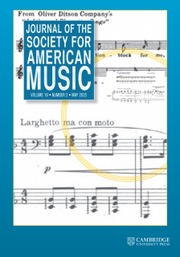Crossref Citations
This article has been cited by the following publications. This list is generated based on data provided by
Crossref.
Cheng, William
2018.
So You’ve Been Musically Shamed.
Journal of Popular Music Studies,
Vol. 30,
Issue. 3,
p.
63.
Swartz, Leslie
Bantjes, Jason
and
Bissett, Faine
2018.
Fitting in and looking pretty: experiences of students with visual impairment participating in ‘inclusive’ ballroom dance classes.
Disability & Society,
Vol. 33,
Issue. 7,
p.
1087.
Holmes, Jessica
and
Eidsheim, Nina Sun
2019.
'A Song for You': The role of voice in the reification and de-naturalization of ablebodiedness.
Journal of Interdisciplinary Voice Studies,
Vol. 4,
Issue. 2,
p.
131.
Deaville, James
2019.
Studying the Study of Television Music and Sound.
American Music,
Vol. 37,
Issue. 4,
p.
400.
Dauncey, Sarah
2020.
Disability in Contemporary China.
VANDERHAMM, DAVID
2020.
“I'm Just an Armless Guitarist”: Tony Melendez, Disability, and the Social Construction of Virtuosity.
Journal of the Society for American Music,
Vol. 14,
Issue. 3,
p.
280.
Renihan, Colleen
2021.
The Little Angels of Popera.
Popular Music and Society,
Vol. 44,
Issue. 4,
p.
416.
Peritz, Jessica Gabriel
2021.
The Female Sublime: Domesticating Luigia Todi’s Voice.
Journal of the American Musicological Society,
Vol. 74,
Issue. 2,
p.
235.
James, Robin
2021.
Sonic Cyberfeminisms, Perceptual Coding and Phonographic Compression.
Feminist Review,
Vol. 127,
Issue. 1,
p.
20.
Ruehlicke, Andrea
2022.
Everything old is new again: reality television celebrity, the Hollywood studio system, and the battle for control of one’s image.
Celebrity Studies,
Vol. 13,
Issue. 1,
p.
39.
Krause, Amanda E.
Forbes, Melissa
and
Lowe-Brown, Xanthe
2022.
Does Reality Television-Style Singing Influence Singing Self-Concept?.
Journal of Voice,
Thorneycroft, Ryan
2023.
Pornographication: exploring the ‘porn’ in ‘inspiration porn’.
Porn Studies,
p.
1.
Meinhart, Michelle
2023.
‘Unearthly Music’, ‘Howling Idiots’, and ‘Orgies of Amusement’: The Soundscapes of Shell Shock at Edinburgh's Craiglockhart War Hospital, 1917–18.
Nineteenth-Century Music Review,
Vol. 20,
Issue. 1,
p.
153.
Wright, Lindsay J.
2024.
Televising Talent: Musicality, Meritocracy, and the Aesthetics of Exclusion.
Journal of the Society for American Music,
Vol. 18,
Issue. 1,
p.
33.




